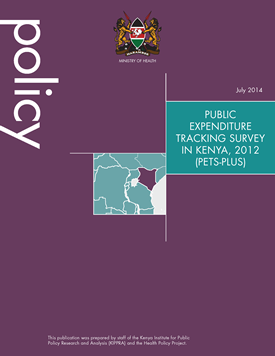The Health Policy Project ended in 2016. Work continued under Health Policy Plus (HP+) until 2022.
PUBLICATION

Author(s): Kenya Institute for Public Policy Research and Analysis (KIPPRA) and the Health Policy Project
Primary Language: English
Date: 7/31/2014
Abstract:
The public expenditure tracking survey with service delivery indicators (PETS-Plus) survey was a comprehensive exercise conducted in 2012 by the Ministry of Health, Kenya in collaboration with the USAID- and PEPFAR-supported Health Policy Project, Kenya Institute of Public Policy Research and Analysis, the World Bank, and the Kenya Medical Research Institute. The PETS-Plus combines the expenditure tracking surveys previously conducted in Kenya with health service indicators (SDI) to provide a comprehensive view of health facilities' overall performance and the impacts of key policy reforms in the sector. Data collected from 294 sampled facilities across 15 counties provide information on the adequacy of infrastructure, medical equipment, medical drugs, human resources for health, and financial planning and management at the facility level. Levels of adherence to key health financing policies on user fees (10/20 policy) and the Health Services Sector Fund/Hospital Management Service Fund (HSSF/HMSF) were also measured, providing critical insights into levels of readiness for devolution in the health sector and the implementation of policies such as free maternal healthcare and removal of user fees at the primary level.
Results of the survey suggest that counties in Kenya need to pay urgent attention to essential drug availability and improve human resource levels by reducing absenteeism and through redeployment. Access to IT equipment and electronic data record systems is needed. Adherence to past user fee policies has been non-uniform, suggesting that implementation of current user fee removal policies should be carefully monitored, and the delivery of HSSF/HMSF funds needs to be improved and strengthened. The PETS-Plus report is supported by three focused policy briefs that examine the results from different perspectives, diving deeper into the findings: effective implementation of the health financing policies; quality of primary healthcare services (using the SDI results); and county readiness for healthcare delivery (a comprehensive look across health inputs). These briefs are available on this page alongside the main report.
Brief Equity Family Planning/Reproductive Health (FP/RH) Health Financing Health Systems Strengthening Maternal Health Other Health Domains Report Kenya

